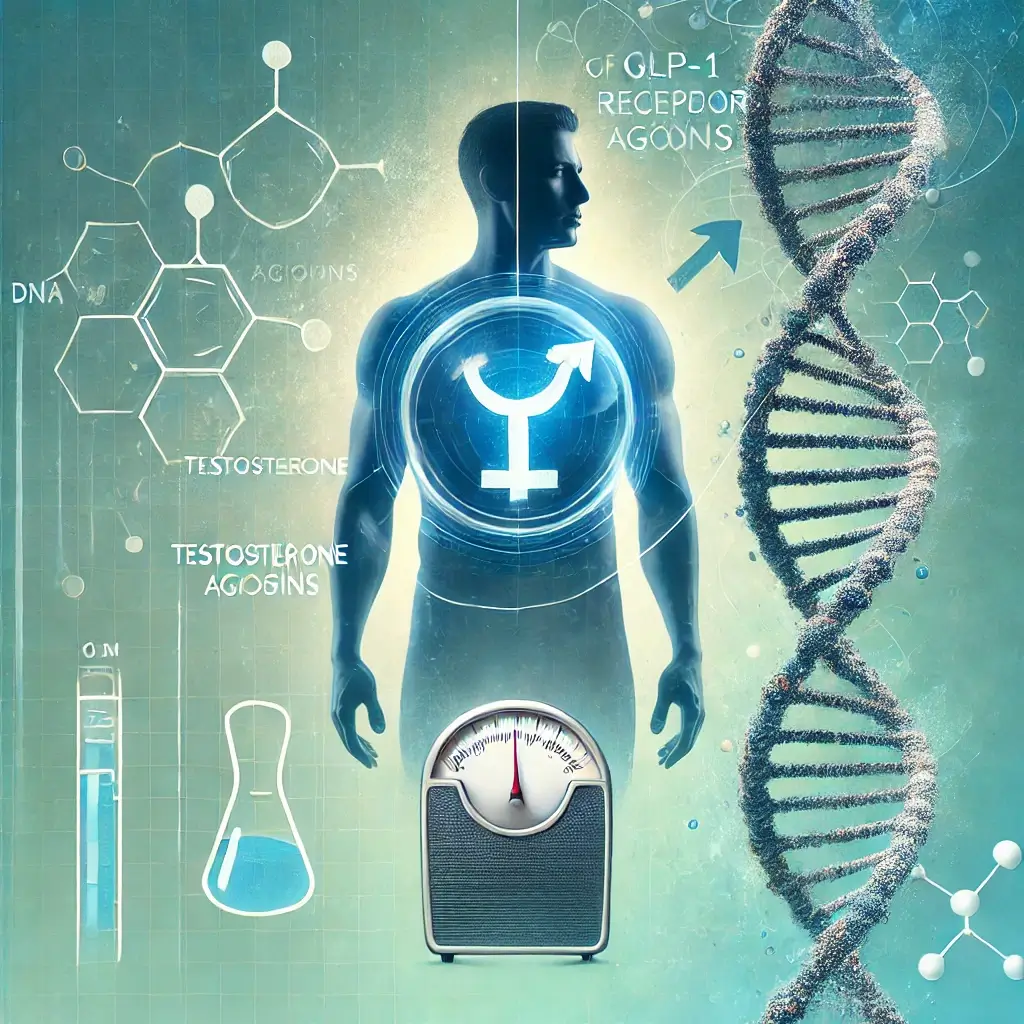New Research Sheds Light on GLP-1 RAs’ Impact on Hormonal Balance in Obesity-Related Hypogonadism
The Potential Benefits of GLP-1 RAs on Testosterone Levels
In testosterone levels, the interaction between GLP-1 receptor agonists (GLP-1 RAs), frequently referred to as GLP-1 for weight reduction, and testosterone levels is somewhat complicated. The following is a summary of what the research results suggest:
Weight Loss and Testosterone: A Positive Connection
Testosterone and Weight Loss: There is evidence that weight loss can boost testosterone levels in obese men and help reduce body fat. Considering that GLP-1 RAs are excellent drugs for weight loss, it is possible that they may indirectly lead to greater testosterone levels through weight loss.
Studies Exploring GLP-1 RAs and Testosterone
A great number of studies have been conducted to determine the possible influence that glucagon-like peptide-1 receptor agonists (GLP-1 RAs), such as liraglutide, could have on testosterone levels in males who suffer from hypogonadism associated with hyperglycemia. Hypogonadism is a condition characterized by low testosterone levels and is frequently observed in extremely obese individuals.
Research Findings on GLP-1 RAs and Testosterone Production
The research in this demographic reveals that GLP-1 RAs may have a direct effect on testosterone production and metabolism. A number of studies have demonstrated that males with obesity-associated hypogonadism who were treated with GLP-1 RAs experienced an increase in testosterone levels. This was in comparison to the individuals who were given a placebo, which is a product that does not contain any active ingredients.
Potential Mechanisms of GLP-1 RAs on Testosterone Levels
Although the theorized methods by which GLP-1 RAs may have an effect on testosterone levels are not yet completely understood, researchers have found numerous potential pathways that could influence testosterone levels. It is possible that GLP-1 RAs could stimulate the release of luteinizing hormone (LH) from the pituitary gland, which would then lead to an increase in testosterone synthesis in the testes. This is one idea that has been proposed.
Direct Impact on Testicular Leydig Cells
GLP-1 receptor agonists may also directly impact the testicular Leydig cells, which are the major cells responsible for the production of testosterone.
Indirect Benefits of GLP-1 RAs on Testosterone Levels
In addition, studies have shown that GLP-1 RAs may enhance insulin sensitivity and reduce inflammation, both of which are associated with hypogonadism caused by obesity. GLP-1 RAs have the potential to indirectly help restore normal testosterone levels in males who have this problem because they eliminate the underlying conditions that cause the condition.
Need for Further Research
Additional extensive research is required to fully elucidate the underlying mechanisms and confirm the clinical implications of these findings. It is important to note that the existing evidence on the relationship between GLP-1 RAs and testosterone levels in men with obesity-associated hypogonadism is still limited. This should be taken into consideration.
Promising Insights for Obesity-Associated Hypogonadism Treatment
In spite of this, the studies that are now being conducted offer encouraging insights into the possible therapeutic implications of GLP-1 RAs in the therapy of hypogonadism that is linked with obesity.
Uncertainties and Considerations
A small amount of research has been conducted on the direct influence that GLP-1 RAs have on testosterone levels in men who do not have hypogonadism or who are not fat. To arrive at conclusive findings, additional research is required.
Weight Loss: The Key Benefit for Testosterone Levels
Pay Attention to Weight Loss: The greatest advantage of GLP-1 RAs for testosterone levels is likely the weight loss normally associated with them. However, direct testosterone replacement therapy cannot be achieved with these drugs.
Mechanism of Action: Still a Mystery
The precise process by which GLP-1 RAs could alter testosterone levels in certain instances is not completely understood. This is because the mechanism is not entirely understood. More research is required to shed light on this matter.
Consult Your Doctor for Personalized Advice
Talk to your physician about the possibility of using GLP-1 RAs for weight loss if you are concerned about low testosterone levels and are considering using them. Their ability to evaluate your specific circumstances and establish whether or not GLP-1 RAs are a good weight loss method for you is a significant advantage.
Alternative Testosterone Treatments
Alternate methods, such as testosterone replacement therapy (TRT), may be suggested by your physician to address hormonal imbalances if you have been diagnosed with low testosterone levels and weight loss is not your major concern.
Importance of Professional Medical Advice
It is important to remember that speaking with a medical professional is essential to understanding your unique circumstances and devising a specialized treatment strategy that will address any hormonal difficulties you may have. They may consider aspects such as your weight, testosterone levels, symptoms, and overall health when recommending the most appropriate course of action.













